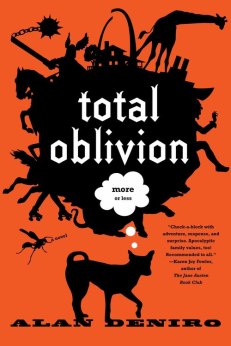Reading the text: Alan DeNiro interview
Posted by Randolph Carter on November 13, 2009
Alan DeNiro is a writer of speculative fiction who has just published his first novel Total Oblivion, More or Less. Here he talks about the book, writing interactive fiction, and gets into his own gaming background as well as offering some tips for the would-be-writers out there.
* * *
Author’s website:
Could you take a minute and explain what your novel Total Oblivion, More or Less is about?
 The novel begins with ancient European tribes–Scythians, Avars, and the like–invading Minnesota, and the rest of the United States, from up north somewhere. Technology stops working and the invaders are able to conquer wide swaths of land until a mysterious empire, from down south somewhere, manages to repulse them and set up very tenuous security. The novel is narrated by Macy, an ordinary 16-year-old girl living in St. Paul, with has a dysfunctional family, who finds her life turned upside-down by these events. She and her family are forced to a refugee camp on an island on what used to be a state park. They manage to escape and make their way down the Mississippi on a converted steamboat to try to get to St. Louis, where Macy’s father may or may not have a job waiting for him. That’s the first big chunk of the novel–much more ensues!
The novel begins with ancient European tribes–Scythians, Avars, and the like–invading Minnesota, and the rest of the United States, from up north somewhere. Technology stops working and the invaders are able to conquer wide swaths of land until a mysterious empire, from down south somewhere, manages to repulse them and set up very tenuous security. The novel is narrated by Macy, an ordinary 16-year-old girl living in St. Paul, with has a dysfunctional family, who finds her life turned upside-down by these events. She and her family are forced to a refugee camp on an island on what used to be a state park. They manage to escape and make their way down the Mississippi on a converted steamboat to try to get to St. Louis, where Macy’s father may or may not have a job waiting for him. That’s the first big chunk of the novel–much more ensues!
Would you mind describing what the process was like for you in getting this novel published?
It was rather disjointed; I had been working on this novel for quite some time (about 4-5 years), and had an agent, but we parted amicably in regards to where the revisions were going. Then after a lot of dead-ends it came together fairly quickly–I found new agent (Colleen Lindsay) when she was just starting at FinePrint; I was her first client actually! Some months later the book was bought by Bantam Spectra (now just Spectra–there was some reshuffling at Random House after the book was bought). It found a great home, but there was still a lot of work left to do on it: quite a bit of copyediting and revisions. Which in the end made it a much better book.
Are you or have you ever been a gamer? What has your gaming experience been like (board games, pen & paper RPGs, console & computer games, etc.)?
Yes, I’ve been a huge gamer for most of my life. It started when I was 10 years old with the D&D Basic “red box” and I haven’t really stopped since. I also had a Texas Instruments TI994/A (16K RAM! Woo-hoo!) and have great memories of games like Parsec and also playing Scott Adams’ Pirate Adventure using a cassette player to load the game. I have been pretty eclectic with games and haven’t fixated continually on one mode for very long. I haven’t had much chance to play too many pen and paper RPGs of late but I’ve been interested in some of the “indie” and “story games” systems (and ideas) that are out there. I also have a DS and Wii and play my fair share of computer games.
Have you ever ventured into online worlds? If so, please explain what that experience has been like.
Yeah, a fair amount. I played a lot of MUDs throughout the years and actually have a character in one now (Icesus), which has a gloriously convoluted system of mechanics. My wife also got me into Eve this year, though I’ve let that lapse the last month or so. Oh, and Free Realms. Free Realms has been a nice way to wind down after work, even though it feels somewhat like a series of mini-games that happen to look like part of a MMORPG. But it’s still a blast. Probably the one actually I had spent the most time in is Kingdom of Loathing, which amused me to no end. The experience has been really different depending on what the creators have hoped to do, and taking those visual and textual clues as a player and running with them. But I’m really interested when there is a measure of surprise in a world, where everything isn’t quite so scripted.
 As someone who obviously appreciates the written word and the art of narrative, do you tend to read the quest text and immerse yourself as much as possible into the story of the game you are playing?
As someone who obviously appreciates the written word and the art of narrative, do you tend to read the quest text and immerse yourself as much as possible into the story of the game you are playing?
It’s an interesting question but I think what draws me in the most are the mood and atmosphere. For example, with Eve, there’s that loneliness of deep space–and then coming across a weird super-sized artifact in the middle of an asteroid–that’s pretty cool. That sense of mystery. I think you can develop that mystery in various ways, sometimes with text, sometimes not. It can be tricky to actually develop story in games–and how to have the right “triggers” to move a story forward. There have been a lot of interesting games in the interactive fiction world, actually, that have experimented with these ideas.
Would you say your gaming experience has had any effect on you as a writer?
I think in two somewhat related ways. First, in terms of content: the way people interact with games and online worlds is something I’m really interested in exploring through my fiction. Secondly, the potential of non-linear storytelling in games has definitely had an affect on my own “linear” writing. The big question is: how do you keep a work of fiction “open” for a reader–to give them glimpses of an entire world (in other words, the APPEARANCE of a sandbox). So much of fiction is about what you don’t write as much as what you write. And in game design, it’s much of the same. Even in the most open world there are still going to be limitations to the map and barriers (some more restrictive than others). So you have to learn (speaking about fiction again) how to work inside those limitations.
You’ve written some interactive fiction. For those who don’t know, would you mind explaining what this is and perhaps talk about your Deadline Enchanter?
Sure–interactive fiction, in a big way, is the original crucible of much of what we’d consider computer gaming, and particularly adventure gaming (with games such as Crowther and Woods’ Collossal Cave Adventure and Infocom’s Zork series). I’m bad at explaining technological things, but from Wikipedia, IF is gaming in which “players use text commands to control characters and influence the environment.” That’s as succinct as a definition as I can think of. Anyway, after textual IF died as a commercial genre in the late 80s or so, the tools to create IF became available to hobbyists and writers. And the field is still going pretty strongly; in fact, it’s a great way for game designers to try out new ideas. There are some IF games released in the last 15 years or so that match the complexity, breadth, and gaming “punch” as any big-budget console game–the games just happen to be done in words rather than graphics. Plus 99.9% are free and widely available on the Internet–so you can’t go wrong with that.
Anyway, I’ve completed and released three works of IF myself, and the one I’m happiest with is the most recent, called Deadline Enchanter. It’s a little bit hard to explain without giving away too many spoilers, but I tried to play with notions of player complicity in a game and point of view. It’s also set in a Faerie Folk city in the middle of the Dakotas. The game won an XYZZY award for Best Use of Medium that year, and that’s something I was absolutely thrilled and humbled by, since I’ve come really late to this game-designing thing.
Where would you point people who are interested in exploring more interactive fiction?
For finding games: The Interactive Fiction Database can get you set up with interpreters (to play the game files) and finding games that suit your desired genre.
For designing your own games, I can’t recommend Inform 7, as an IF-friendly programming language, enough. Believe me, if I can do it, anyone can. There are also languages such as TADS and Hugo, so you might want to poke around a bit to find what you need.
Would you say there is grind involved in the writing process?
There is; not as much in the original moments of creation but in the revision process. The trick is to make revision and editing as exciting as when you first put the words for a project down on a page.
By contrast, what would you say is one of the most rewarding things about being a writer?
Realizing that characters do and say things that you really didn’t expect. I know that sounds kind of goofy, but it happens all the time. It all comes down to the characters for me and what kinds of emotions and decisions they are working through.
When do you find time to write?
That…is an excellent question. I have a full-time day job, so it can be a struggle. Mostly cram sessions on the weekends and during lunch breaks when I can.
Many of the authors I’ve interviewed view gaming as a potential threat to their productivity as a writer. As someone who has and continues to game, how have you managed to reconcile these activities in your life?
Excellent question! I think it can be a real challenge to strike the right balance. Lord knows I’m astoundingly capable of procrastination. But, aside from the “research” component (that is to say, I tend to write a lot about how people incorporate fantasy into their own lives, and gaming is a prime example of that), I do think that the storytelling within games continues to grow and evolve at a rapid pace, and that in and of itself is exciting and gives me ideas about my own fiction. Also, with the content delivery (to use a really arid term) of books on the cusp of changing on the digital end of things, I’m really curious–and actually hopeful–about the merging of different storytelling media. Who’s to say in ten years what some novels might look like? Some might very well have, on whatever near-future digital platform, some gaming component that augments the novel. Or vice-versa. It all depends on what story one needs to tell. What are the best tools to carry that out? The great thing is, more and more tools are becoming available to us. And in that, I’m pretty agnostic about form. I love static fiction, but it’s a means to an end, just like the poems I write, or the interactive fiction. So in that light, aside from having fun with my gaming, I try to play many games like a writer reads novels–you’re reading for enjoyment, sure, but you’re keeping an eye on the craft as well.
How do you tend to escape these days?
Some of the aforementioned games, playing and taking walks with our two dogs, fostering kittens, and working on the yard. Pretty mundane stuff.
Would you have any words of advice for the would-be-writers out there?
 1. Don’t worry about trends. There are stories only you can tell and those are the stories other people are going to want to hear.
1. Don’t worry about trends. There are stories only you can tell and those are the stories other people are going to want to hear.
2. Treat editing as part of the creative process.
3. Find a group of like-minded peers; it’s a lonely business and you need support and to give support to other writers.
4. Pay attention to writing in other cultures and other genres; reading divergent materials is what’s going to allow your own voice to grow.
5. Have fun. If you’re finding a project too grueling, take a break from it and move to something else in a somewhat different genre or medium, and come back with a fresh perspective.
You wake up to a world where Total Oblivion, More or Less has been made into an MMORPG. What character would you play and why?
Hmm, probably Em, who is the captain of a submarine that may or may not date back to the Byzantine Empire, and is much, much larger on the inside than outside. Anyway, she is a resident bad-ass in the novel.
Is there anything else you’d like to share with this gamer/reader audience?
Really appreciate the opportunity to chat on your blog!
This entry was posted on November 13, 2009 at 2:35 pm and is filed under Uncategorized. Tagged: Alan DeNiro, Alan DeNiro interview, Author interview, Fantasy fiction, Interactive fiction, Reading the text. You can follow any responses to this entry through the RSS 2.0 feed. You can leave a response, or trackback from your own site.
georgek said
hey, great to see this interview! Deadline Enchanter is one of my favorites.
Alan DeNiro @ Grinding to Valhalla « Kooneiform said
[…] Reading the text: Alan DeNiro interview. […]
Interesting interview « Emily Short’s Interactive Fiction said
[…] Emily Short’s Interactive Fiction Interactive stories and games; essays, reviews, and how-to suggestions « Screenshots Interesting interview November 13, 2009 with Alan DeNiro, author of Deadline Enchanter, who has also just published his first novel. […]
Post Position » IF Author, Novelist Alan DeNiro said
[…] an interview with Alan DeNiro now up at Grinding to Valhalla. DeNiro is author of the just-published Total Oblivion, More or […]